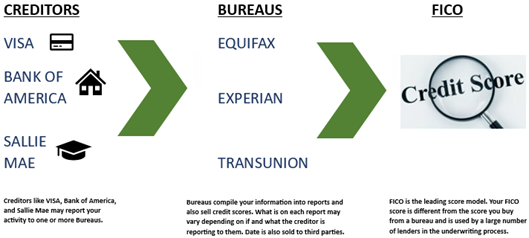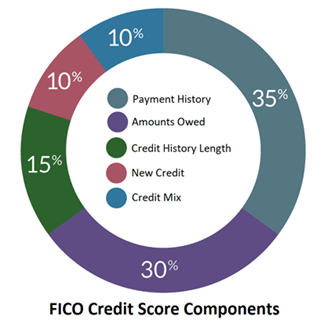
What is a credit score? Why is it important?
Your credit score is a three-digit number (generally between 300-850) that lenders use to assess your creditworthiness. It’s based on a variety of factors, including your payment history, debt levels, and length of credit history. Credit scores are an important indicator of your financial health. Credit bureaus like TransUnion, Experian, and Equifax collect data from lenders about your loans, track your loan history, and create a “grade” that lenders use to determine how likely you are to pay off a loan. A good credit score can save you money on interest rates, insurance premiums, and other expenses, so it’s important to understand and know how to manage your credit score.
The “credit score jungle” is a complex and ever-changing place. It can be challenging to navigate, and it’s easy to get lost but there are ways to survive, thrive, and protect yourself in that credit score jungle!
How Do I Build Credit History (and survive in the credit score jungle)?
The first step to surviving the credit score jungle is understanding how it works. Here are a few things you need to know:
- Your payment history is the most important factor in your credit score. Make sure to pay your bills on time, every time.
- Your debt levels should be low. Aim to keep your credit utilization ratio (the amount of debt you have compared to your total available credit) below 30%.
- Don’t close the first account you ever opened. The longer you have a good credit history, the better your score.
- New credit can hurt your score in the short term. Try to limit the number of new accounts you open each year.
- A mix of different types of credit is good. Having a credit card, a loan, and a line of credit can help improve your score.
- A score of 629 or lower is considered bad, while anything over 720 is generally considered excellent.
- Review your credit score at least once a year. Use a free credit monitoring service (through your credit card company, bank or credit bureaus, or a secure website like creditkarma.com.) Or order a credit report from annualcreditreport.com or freecreditreport.com.
Source: https://www.badcredit.org/how-to/how-to-improve-your-credit-score/
How Do I Improve My Credit Score (and thrive in the credit score jungle)?
Once you understand how the credit score jungle works, you can start to thrive. Here are a few tips:
- Get a secured credit card. A secured credit card is a good way to build your credit history if you don’t have any credit.
- Become an authorized user on another person’s credit card.
- Get a co-signer. A co-signer is someone who agrees to be responsible for your debt if you don’t make your payments. Getting a cosigner can help you get approved for a loan or credit card, which can help you build your credit history.
- Take out a credit builder loan. This is designed to help people with bad or no credit build their credit history. With a credit builder loan, you borrow a small amount of money and then make monthly payments to the lender. The lender reports your payments to the credit bureaus, which can help improve your credit score.
- Pay down your debt. The more debt you have, the lower your credit score will be. Make a plan to pay down your debt as quickly as possible. Micropayments throughout the month can reduce average monthly account balances, reduce accrued interest and help avoid late payments.
- Set up auto-pay. Schedule payments to be in line with your pay periods.
- Increase your credit limit. When your limit goes up and your balance stays the same, your utilization decreases and your score goes up automatically. Be responsible! Don’t spend more.
- Dispute inaccurate information. If there is any incorrect information on your credit report, dispute it. This can help improve your credit score.
How Do I Freeze My Credit (and protect myself in the credit score jungle)?
A credit freeze is a security measure that prevents lenders from accessing your credit report without your permission. This can help protect you from identity theft and fraud.
To freeze your credit, you can contact each of the three major credit bureaus:
Equifax: 1-800-322-8228
Experian: 1-888-397-3742
TransUnion: 1-888-909-8872
You can also freeze your credit online at each bureau’s website. After creating a user name and password at each bureau, you can unfreeze your credit for a period, or you can unfreeze it permanently.
If you think you may have been a victim of identity theft, you should freeze your credit immediately. You can also freeze your credit if you are planning to travel internationally.
Building or improving your credit score takes time and effort, but it is worth it. A good credit score can save you money on interest rates, insurance premiums, and other expenses.
So, what are you waiting for? Start taking steps to improve your credit score today!

